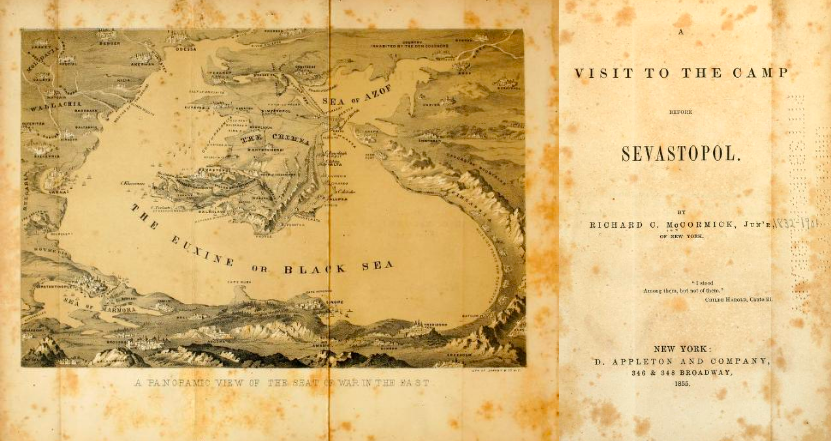by Jim Garrison

The telegram, railroad, printing press, and the increase in literacy among the average citizens all lead to the birth of a new kind of journalism. The modern war correspondent provided crucial updates on the war from the battlefront that quickly reached citizens back home in only a matter of days.[1] The population could be informed of their government’s handling of the war more than ever before.
Richard McCormick spent most of his time in Balaklava observing the British and French troops and the current state of Sevastopol.[2] McCormick was not the only war correspondent in Crimea during the war. William Howard Russell, often considered the father of modern war correspondents, gained his fame writing for the London Times.[3] His determination to expose the dirty sides of the war and fearless criticism of his government’s military decisions brought him worldwide recognition. Karl Marx wrote for the New York Tribune criticizing what he called the Russian Menace.[4] Leo Tolstoy’s experience in Crimea inspired him to write Sevastopol Sketches which describe the buildup to the fall of Sevastopol in the fall of 1855.[5] The work these men did in Crimea brought the horrors of war to the people back home, encouraging greater caution and accountability on the part of their governments.
[1] ED: For more on the importance of the Crimean War to the history of journalism, see: Cross, Anthony. “The Crimean War and the Caricature War.” The Slavonic and East European Review 84, no. 3 (2006): 460-80. Accessed March 17, 2021. http://www.jstor.org/stable/4214321; Ulrich Keller, The Ultimate Spectacle: A Visual History of the Crimean War (Amsterdam 2001); Trudi Tate, A Short History of the Crimean War (London: I. B. Taurus, 2018); Alexis Peri, “Heroes, Cowards and Traitors: the Crimean War and its Challenge to Russian Autocracy,” Berkeley Program in Soviet and post-Soviet Working Paper Series (Institute of East European and Eurasian Studies, University of California, Berkeley, Summer, 2008); and other works cited herein.
[2] Eugene E. Williams, “The Territorial Governors Of Arizona-Richard Cunningham McCormick,” Arizona Historical Review, n.d. The University of Arizona with the cooperation of Arizona Pioneers Historical Society (Tucson, AZ).
[3] ED: William Russell’s Correspondence have been gathered into an edited collection. William Howard Russell, Despatches from the Crimea, edited by Nicholas Bentley (New York: Hill and Wang, 1967).
[4] ED: Karl Marx, The Eastern Question: A Reprint of Letters Written 1853-1856 dealing with the Crimean War (New York: Burt Franklin, 1968)
[5] ED: For an English langauge discussion of Tolstoy’s Sevastopol Sketches, see Liza Knapp, “Tolstoy’s Sevastopol Sketches: Pathos, Sermon, Protest, and Stowe,” pp. 211-266 in Before they Were Titans: Essays on the Early Works of Tolstoy and Dostoevsky, edited by Elizabeth Cheresh Allen (Boston, MA: Academic Studies Press, 2015).